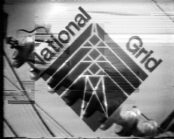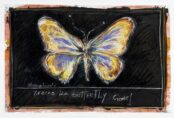[dropcap style=”font-size:100px; color:#992211;”]T[/dropcap]his release follows on from last year’s excellent (and modestly-titled) The Revelation according to Frank Benkho, which in its own way was revelatory.
It introduced a producer skilled at atmospheric experimental analogue synthesis, making an immediate impression. With modular and analogue synths so popular at present there’s no shortage of artists releasing work fixed almost anally on such equipment and the results are not always convincing. They can be inward-looking, self-referential, overly technical. Benkho’s music displays none of these faults and is clearly informed by real creative talent.
His background isn’t that of the stereotypical analogue nerd. He studied design and architecture and is a member of the Chilean Electroacoustic Community (CECh). Perhaps Chile is far enough removed from fleeting fashions and geographically remote enough to act as a productive breeding ground for a distinctive mode of electronic music.
The album’s knowingly ‘spacey’ titles seem to allude to the golden age of cosmic synthesiser music and some of the sounds have a similar ‘dawn of time’ feeling, but without falling into cosmic clichés. The sounds are produced using a fully-documented list of analogue equipment plus voice and effects. While there’s improvisation behind some of the sequences the music generally avoids the trap of sounding self-consciously ‘improv’.
With its playfully retro scif-fi video, the opening ‘Escape To Planet Mars’ is a great scene-setter. The dramatic opening chords are reminiscent of the Mexican producer Murcof and are succeeded by a growing, mutating mass of alien processes and bleeps.
‘Deep Love Beneath Earth’ opens with a possibly ironic filtered vocal that soon gives way to intense, kosmische deep space arpeggios that create a timeless sense of movement in the vein of the 1970s Berlin School. In the final section these give way to more tranquil chords and drones that seem to convey a sense of arrival.
Despite its slightly comical title, ‘Jogging On Venus’ is a very serious track and one of the highlights of the album. It’s a dense soundfield litttered with pulsing radioactive debris and cosmic wow and flutter. As the sounds intensify further a deeper alarm pulse intrudes, giving a sense of Benkho’s machines working at full intensity. Things begin to malfunction in the mid-section that leads to a superb final sequence that establishes Benkho as a worthy heir to the BBC Radiophonic Workshop.
‘The Space Between Us’ is a more dynamic and relatively aggressive piece, with fast sequences augmented by morse-like patterns and corroded sequences that sound like distorted data transmissions. This is no cosy, nostalgic take on the analogue sound but a vivid and almost dangerous blast of sound.
What seems like smeared vocals resurface in the murky depths of ‘No Money, No Planet’, the least linear and most overtly experimental track, which sounds constantly on the brink of disintegration – a rickety assemblage held together only by space winds and pulses.
‘The Brightest Object On The Night Sky’ is a slow, anthemic coda, marked out by analogue pulses and ever-present but never- clichéd cosmic winds animating slow-moving clouds of analogue debris. In the final section the main bass pulse winds down briefly giving way to ephemeral chords that again evoke the romantic lost era of Tangerine Dream et al.
FRANK BENKHO
A Trip To The Space [Between]
DL Clang 037

From Speak and Spell to Laibach.






















